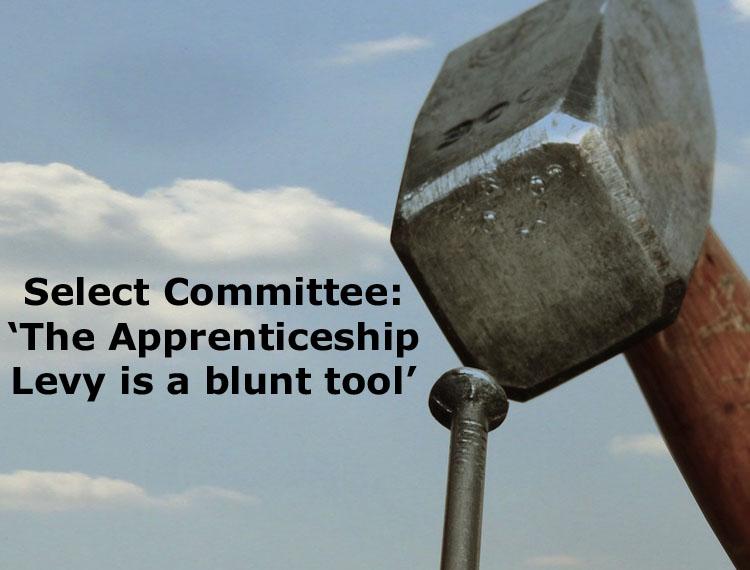The recommendations from the Select committee’s Apprenticeships report and the sector response

An influential committee of MP’s, formed by the Education and Business Committees, published it’s 54-page Apprenticeships report today (click here to view the full report). The Sub-Committee’s inquiry has examined the Government’s apprenticeships policies, including the Apprenticeship Levy, due to be introduced next week, and the target of three million apprenticeship ‘starts’ by 2020.
We thought it would be helpful to highlight the sub-committee’s Apprenticeship recommendations, their conclusions and then to give the sector’s response to the report.
The Commons Sub-Committee on Education, Skills and the Economy didn’t pull any punches and concluded that the “The Apprenticeship Levy is a blunt tool in which contributions are unlikely to bear any relation to the skills needs of individual employers and their sector more generally. It is not sufficiently focussed on areas of the economy, and of the country, where training is most needed”.
The Committee also highlighted (as many providers are discussing on social media): “We are not convinced that introducing price competition into the apprenticeship system will have the effect the Government intends. It is unclear whether there will be enough information available to employers to choose between providers. If this proves to be the case, there will either be little competition or, more damagingly, competition based purely on price which could drive down quality.“
Highlighted recommendations are: The Committee recommends that Ofqual should be given responsibility for the external quality assurance of all end-point assessments. Standards should have at least one approved assessment organisation in place before they can be delivered. The committee also concluded that ‘There remains a lack of clarity about the long-term funding arrangements for non levy-paying employers.’ They also recommended that ‘Ofsted develop and publish a clear strategy, and related guidance for training providers, setting out how it plans to inspect standards-based provision, in particular that provided by employer-providers.’
The Committee’s Apprenticeship recommendations in full:
Strategy
- Alongside the 3 million starts target, the Government outlines far clearer outcome measures for individual apprentices. These should include programme completion, progression to higher levels and subsequent achievement of secure relevant employment. It should publish an annual survey of performance against these measures.
- The Government has not set out how its increase in apprenticeship numbers will help fill the country’s skills gaps. The current balance of provision is skewed towards sectors with low wage returns and few skills shortages and we are not convinced that tinkering with funding bands will bring about the major changes necessary. The Government already makes immigration decisions on the basis of identified skills shortages; it should make greater use of this existing knowledge.
- The Government publishes an annual document setting out skills shortages on a national, regional and sector-specific basis and sets clear targets to ensure apprenticeship uptake in these areas is prioritised.
- The Government should keep the public sector target under review and enable increased participation in areas of the public sector with clear skills shortages.
- The Government examine further measures to make apprenticeship more accessible to all. This could include changes to benefits rules, subsidised transport or direct financial support.
- The Government sets out its careers strategy as soon as possible. As we said previously, it is urgently needed and must include immediate steps to ensure all young people have access to high quality careers advice.
The Institute for Apprenticeships
- The committee are concerned that the Institute, a body with a clear mandate to protect the quality of apprenticeship standards and assessments, is also being asked to work towards the Government’s three million target. This risks incentivising quantity rather than quality. If the Institute proves successful in raising the quality of apprenticeships, they will sell themselves.
- The Government carefully monitor whether the Institute has sufficient resources to fulfil its role and acts quickly to solve any emerging capacity issues
- The Institute appoint a permanent Chief Executive as soon as possible.
- The Institute should not be required to work towards the three million target. Its role should be confined to ensuring quality within the system. Its independence should be respected by Government.
Standards
- New standards should include greater detail about how training could be delivered, although there should be no obligation for employers to follow this advice.
- The Trailblazer system has not made a clear enough distinction between the role of the employer—defining the skills, knowledge and behaviours an apprentice must acquire and demonstrate—and the role of assessment professionals—designing the means by which this is evaluated. We welcome the Institute’s proposals to clarify these roles.
- Standards should have at least one approved assessment organisation in place before they can be delivered.
- The integrity of the apprenticeships undertaken under new standards depends on the consistency and reliability of end-point assessment. We are unconvinced that the Government’s current model of external quality assurance will achieve this.
- Ofqual should be given responsibility for the external quality assurance of all end-point assessments.
Funding
- The Apprenticeship Levy is a blunt tool in which contributions are unlikely to bear any relation to the skills needs of individual employers and their sector more generally. It is not sufficiently focussed on areas of the economy, and of the country, where training is most needed.
- We recommend that the Government, as part of its continuing review of the operation of the levy, consider whether a single rate is the best approach and explore ways of restructuring the levy on a sectoral and regional basis.
- There remains a lack of clarity about the long-term funding arrangements for non levy-paying employers, and how this may or may not relate to levy yield and how much training levy-paying employers choose to provide.
- We are not convinced that introducing price competition into the apprenticeship system will have the effect the Government intends. It is unclear whether there will be enough information available to employers to choose between providers. If this proves to be the case, there will either be little competition or, more damagingly, competition based purely on price which could drive down quality.
- We recommend that the Government, in cooperation with Ofsted and the Institute, closely monitor the effect of price competition on apprenticeship quality.
Training
- We recommend that Ofsted develop and publish a clear strategy, and related guidance for training providers, setting out how it plans to inspect standards-based provision, in particular that provided by employer-providers.
- If the Government’s reforms prove successful, far more employers will offer apprenticeships. It is important that they all have the knowledge and capacity to support and mentor these apprentices in the workplace.
So there are a lot of recommendations.
What does the sector think?
 Mark Dawe, Chief Executive of the Association of Employment and Learning Providers (AELP) said:
Mark Dawe, Chief Executive of the Association of Employment and Learning Providers (AELP) said:
“The Sub-committee has made some very telling observations about the current reforms to the apprenticeship programme and we urge the government to act without delay on its recommendations. In particular ministers must address the ‘lack of clarity’ about the long-term funding arrangements for smaller non-levy paying employers. In AELP’s view, a guaranteed minimum budget of £1bn a year is needed to maintain the apprenticeship opportunities that SMEs offer.
“We agree with the MPs that last August’s funding proposals for 16 to 18 year old apprentices represented ‘the opposite of social mobility’ and we remain concerned that the subsequent changes to funding are still not adequately addressing the issue.
“The Sub-committee rightly points to the need for guidance on the definition of off the job training. AELP has been in close discussion with Ofsted and DfE on this matter and provided them with many practical examples. Some new guidance is expected and we urge that the government publishes it before 1st May
“The MPs are totally correct in saying that apprentices should not be allowed to begin training without an assessment organisation in place. We would add that an approved assessment process itself should also be in place first with an agreement on its price. This wouldn’t happen in academic education and it’s double standards to allow it in a vocational programme. We also agree that Ofqual should be given responsibility for the external quality assurance of all end point assessments.
“On the Sub-committee’s general observations on the levy and its impact on the economy and key sectors, the government does indeed have to make up its mind. When the non-levy paying employers join the Apprenticeship Service (TAS), the programme’s funding allocations will be entirely driven by employer demand, irrespective of which sector an employer is in. In theory then, the government could have no real say on whether key sectors can be favoured unless it starts widening the differences between sector and standards funding rates very significantly. If it chooses to do this, it would be helpful in line with the Industrial Strategy if we could have an agreed strategic approach.”
 Stephen Evans, Chief Executive of the Learning and Work Institute said:
Stephen Evans, Chief Executive of the Learning and Work Institute said:
“The expansion of apprenticeships is a good thing. But the committee is right to be concerned that in the dash for 3 million we risk hitting the target but missing the point. We’re delighted the committee calls for a greater focus on access. Our research shows that black, asian and minority ethnic applicants are half as likely to succeed in their application and only 600 of 17,500 engineering apprentices are women. We need the same focus on access to apprenticeships as we do on widening participation in higher education. We’ve called for an Apprentice Premium, mirroring the Pupil Premium, to help do this.
“On quality, the committee is spot on that assessment organisations should be in place before apprentices start – it is inconceivable this would be allowed in other forms of education – and to report annually on outcomes for apprentices, looking to match the best in the world. Lastly, we’re pleased to see the committee mirror our call for measures to focus apprenticeships on sectors and areas identified in the Industrial Strategy. With 40% of Levy-paying employers based in the South East, the risk otherwise is that the programme doesn’t match future skills needs.
“The expansion of apprenticeships is welcome – it can help boost prosperity and fairness. But to do so we need a laser-like focus on quality and access.”
 Teresa Frith, Senior Skills Policy Manager for the Association of Colleges (AoC), said: “AoC has always said that there will be tensions between the Government and employers over the way apprenticeship levy money is spent.
Teresa Frith, Senior Skills Policy Manager for the Association of Colleges (AoC), said: “AoC has always said that there will be tensions between the Government and employers over the way apprenticeship levy money is spent.
“AoC has always said that there will be tensions between the Government and employers over the way apprenticeship levy money is spent.
“The Government is keen to see high level apprenticeships in STEM subjects, but we may find that what employers need or want is a more generic apprenticeship at a lower level. Individual employers will understandably focus on what is best for their own business, rather than what is necessarily best for the UK or even their own sector. The pattern of demand and delivery is still unknown.
“AoC would like to see careful monitoring of how employers’ choices over the apprenticeships they want and need, is reflective of what the Government wants if it is to tackle the UK’s skills gaps.”
 Petra Wilton, director of strategy for the Chartered Management Institute, said:
Petra Wilton, director of strategy for the Chartered Management Institute, said:
“This new report on Apprenticeships is right to focus on the critical need to raise the quality and prestige of apprenticeships, but it’s far too early to claim that these apprenticeships are missing the skills needed to grow the economy.
“We know that businesses are using the new trailblazer apprenticeships to genuinely employ new talent or upskill their managers. The new focus on higher level degree apprenticeships shows that employers are focusing on where the skills gaps are most acute, with the Chartered Manager, digital and engineering degree apprenticeships seeing by far the biggest uptake.
“However, we agree with the report’s warning that schools are failing to promote apprenticeships. Urgent action needs to be taken to raise awareness among young people and their parents of the professional opportunities prestigious new apprenticeships now offer.”
 Kirstie Donnelly, Managing Director of City & Guilds said:
Kirstie Donnelly, Managing Director of City & Guilds said:
“The Sub-Committee on Education, Skills and the Economy is right to draw attention to the pressing challenges around the introduction of the apprenticeship levy and warn that both the levy and three million target are at risk of being blunt instruments. While we support expanded access to apprenticeships 100%, this has to be matched by a focus on quality and on providing apprenticeships that will benefit young people and businesses. A third of liable employers told us recently that they weren’t aware they even have to pay the levy, which is worrying given that it’s due to be introduced imminently.
“The Committee’s recommendation that Ministers should look at the levy’s application on regional and sectoral levels is spot on.. Local labour market information simply must be factored into planning for apprenticeships, so that the positions on offer match the skills needs of the future. At the moment, young people face a careers advice postcode lottery, with young Londoners far better exposed to different jobs and opportunities than those in cities like Leeds, while too many schools are still failing to promote non-university routes.
“The introduction of the apprenticeship levy next week presents a huge, historic opportunity to build a skills training system we can be proud of and that can meet many of the challenges of the future, from skills gaps to Brexit. For this to happen we need businesses to get on board, schools to prioritise practical careers advice, and ministers to listen to the experts, including the findings of this report.”
 Lindsay McCurdy, Chief Executive of Apprenticeships 4 England said: “The Sub-committee has made some very valid points about the current reforms to the apprenticeship programme and we urge the government to act without delay on its recommendations. The lack of clarity about the long-term funding arrangements for smaller non-levy paying employers this information must be released asap. We need more information on how off the job training 20% of an apprentice working hours is to be implanted, especially for sme’s or for people who have been employed by the business in some cases for years before starting an apprenticeship, we urgently need more information for businesses and training providers.
Lindsay McCurdy, Chief Executive of Apprenticeships 4 England said: “The Sub-committee has made some very valid points about the current reforms to the apprenticeship programme and we urge the government to act without delay on its recommendations. The lack of clarity about the long-term funding arrangements for smaller non-levy paying employers this information must be released asap. We need more information on how off the job training 20% of an apprentice working hours is to be implanted, especially for sme’s or for people who have been employed by the business in some cases for years before starting an apprenticeship, we urgently need more information for businesses and training providers.
“The Sub-committee has made some very valid points about the current reforms to the apprenticeship programme and we urge the government to act without delay on its recommendations. The lack of clarity about the long-term funding arrangements for smaller non-levy paying employers this information must be released asap. We need more information on how off the job training 20% of an apprentice working hours is to be implanted, especially for sme’s or for people who have been employed by the business in some cases for years before starting an apprenticeship, we urgently need more information for businesses and training providers.
“End point assessment: more guidance on price and who is going to be delivering the standards already approved. The report is right in saying Standards should have at least one approved assessment organisation in place before they can be delivered, App4England would suggest this is a min requirement.
“App4England agrees with the report’s warning that schools are failing to promote apprenticeships. Apprenticeship starts for young people have not grown in the past decade, we need urgent action to raise awareness among young people parents and businesses to the value of the apprenticeship route.
“A third of employers are still unaware that they even have to pay the levy, which is worrying given that it’s due to be introduced within days.
“With so many changes taking place in the apprenticeship sector, we must ensure the sector does not end up with egg in its face and that the apprenticeship brand is protected and is seen as alternative quality route.”
 Dr Mary Bousted, general secretary of the Association of Teachers and Lecturers (ATL), said:
Dr Mary Bousted, general secretary of the Association of Teachers and Lecturers (ATL), said:
“We agree with the Government that apprenticeships are an important route to work and play a vital role in developing skills. However, as the Select Committee makes clear, the Government has prioritised reaching an arbitrary target of apprenticeship starts and placing employers in the driving seat. This blinkered approach is resulting in the needs of learners and the labour market being lost.
“We share the Select Committee’s conclusion that these reforms will not fill skills gaps, as the availability of apprenticeships varies significantly by sector and between areas of the UK. The Government has done nothing to address this and, as skills gaps are set to grow significantly post-Brexit, the Government needs to take action immediately.”
ATL calls on the Government to:
- Fund the Institute for Apprenticeships adequately so that all apprenticeships are of a high quality and provide transferrable skills.
- Fully involve the FE workforce and trade unions at every level of apprenticeship development, delivery and quality assurance as they have the relevant expertise to make these work.
Peter Finegold, Head of Education and Skills at the Institution of Mechanical Engineers, said: “The Institution welcomes the views of the Sub-Committee set out in its new report on apprenticeships and supports the Committee’s recommendation that the 3 million apprenticeship target should not be the only measure of success.
 Steve Hill, External Engagement Director at The Open University, said:
Steve Hill, External Engagement Director at The Open University, said:What do you think? Do you agree with the committee?












Responses